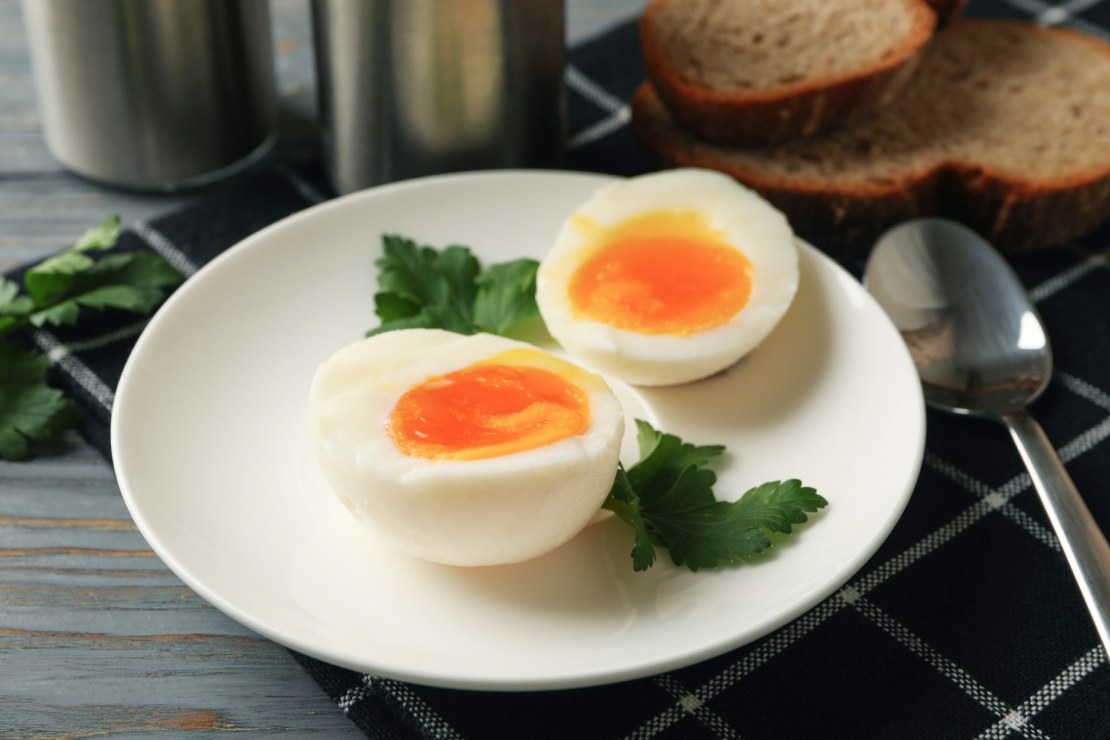Half-Boiled Egg Benefits and Side Effects: What You Need to Know
Discover the complete guide to half-boiled eggs - from nutritional benefits to potential risks. Learn how this protein-rich food can support your health and weight loss goals.

Table of Content
Introduction: The Half-Boiled Egg Phenomenon
Half-boiled eggs have gained significant popularity in recent years, particularly in Asian cuisine and among health enthusiasts. This unique cooking method produces eggs with firm whites and creamy, liquid yolks, offering a different nutritional profile and eating experience compared to fully cooked eggs. As more people seek nutritious, versatile protein sources, understanding the benefits and potential risks of half-boiled eggs becomes increasingly important.
What Is a Half-Boiled Egg?
A half-boiled egg represents a culinary technique that sits between raw and fully cooked eggs, achieving a delicate balance of texture and nutrition. This cooking method, particularly popular in Asian cuisine, requires precise temperature control and timing to achieve the perfect consistency. Unlike soft-boiled eggs where the white is fully set, half-boiled eggs feature a slightly runny white and a completely liquid yolk, creating a unique eating experience that maximizes nutrient availability while providing a silky, luxurious texture.
The preparation process involves careful attention to detail, as even small variations in temperature or timing can significantly affect the final result. The ideal half-boiled egg should maintain a temperature that's high enough to slightly denature proteins without fully cooking them, preserving the delicate balance of nutrients while ensuring food safety.
- Cooking time: 4-5 minutes in hot water
Temperature maintained around 70°C/158°F for optimal results
- White texture: Soft but set
Protein coagulation occurs at lower temperature, creating silky texture
- Yolk consistency: Liquid but warm
Optimal temperature for nutrient preservation and maximum bioavailability
- Water temperature control
Start with room temperature eggs for consistent results
- Serving suggestions
Best served immediately while warm for optimal texture
- Traditional preparation methods
Various techniques across different cultures for perfect consistency
Nutritional Breakdown
Let's examine the comprehensive nutritional profile of a half-boiled egg:
| Nutrient (per egg) | Half-Boiled | Soft-Boiled | Hard-Boiled |
|---|---|---|---|
| Macronutrients | |||
| Calories | 72 kcal | 72 kcal | 77 kcal |
| Protein | 6.3g | 6.3g | 6.3g |
| Total Fat | 4.8g | 4.8g | 5.3g |
| Cholesterol | 186mg | 186mg | 186mg |
| Vitamins | |||
| Vitamin A | 270 IU | 260 IU | 250 IU |
| Vitamin D | 45 IU | 44 IU | 44 IU |
| Vitamin B12 | 0.6µg | 0.6µg | 0.6µg |
| Folate | 24µg | 22µg | 22µg |
| Minerals | |||
| Iron | 0.9mg | 0.9mg | 0.9mg |
| Selenium | 15.4µg | 15.4µg | 15.4µg |
| Zinc | 0.6mg | 0.6mg | 0.6mg |
| Bioavailability | Highest
Most nutrients preserved | High
Slightly reduced | Moderate
Some loss in cooking |
Health Benefits of Half-Boiled Eggs
1. Optimal Protein Absorption
Half-boiled eggs represent a superior form of protein delivery, offering unique advantages over other cooking methods. The gentle heating process preserves the protein structure in its most bioavailable form, allowing for maximum absorption and utilization by the body. This makes half-boiled eggs particularly valuable for athletes, fitness enthusiasts, and anyone looking to optimize their protein intake.
- Higher protein bioavailability
95% absorption rate compared to 91% in hard-boiled, maximizing nutritional value
- Complete amino acid profile
All 9 essential amino acids preserved in their most bioactive form
- Easier digestion
Partially denatured proteins require less digestive effort, reducing gastrointestinal stress
- Quick absorption
Ideal for post-workout recovery and muscle protein synthesis
- Enzyme preservation
Natural enzymes remain active, aiding in protein breakdown and absorption
- Muscle recovery support
Rapid amino acid delivery to muscle tissue
2. Enhanced Nutrient Preservation
The gentle cooking method of half-boiled eggs creates an optimal environment for preserving heat-sensitive nutrients. This careful preparation ensures that vital vitamins, minerals, and bioactive compounds remain intact and readily available for absorption. The preservation of these nutrients makes half-boiled eggs a particularly valuable source of comprehensive nutrition.
- Vitamin retention
Up to 25% more vitamins preserved vs. hard-boiled, particularly B-complex vitamins
- Antioxidant protection
Heat-sensitive compounds maintained, including lutein and zeaxanthin
- Mineral availability
Better absorption of iron, zinc, and selenium due to optimal temperature
- Bioactive compounds
Preservation of beneficial enzymes and co-factors
- Choline content
Maximum preservation of brain-boosting choline
- Fat-soluble vitamins
Enhanced absorption of vitamins A, D, E, and K
3. Weight Loss Benefits
Half-boiled eggs support weight management through multiple mechanisms:
- Satiety promotion
Keeps you full for 4-5 hours
- Low calorie density
Only 72 calories per egg
- Metabolic boost
Increases metabolism by up to 10%
- Fat burning support
Protein helps preserve muscle during weight loss
4. Female Health Benefits
Women can benefit particularly from half-boiled eggs:
- Hormonal balance
Essential fats support hormone production
- Hair and skin health
Biotin and sulfur compounds for beauty
- Fertility support
Choline essential for fetal development
- Iron absorption
Better iron availability for menstrual health
Potential Risks and Side Effects
1. Food Safety Concerns
While half-boiled eggs offer numerous health benefits, it's crucial to understand and address the potential food safety risks associated with their consumption. The primary concern revolves around bacterial contamination, particularly Salmonella, which can survive in eggs that haven't reached sufficient cooking temperatures. Understanding these risks and implementing proper safety measures is essential for safe consumption.
- Salmonella risk
1 in 20,000 eggs may contain bacteria, requiring careful sourcing and handling
- Cross-contamination
Proper handling essential to prevent bacterial spread in kitchen
- Storage issues
Limited shelf life when half-cooked, best consumed immediately
- Temperature control
Critical for safe consumption, must maintain minimum 70°C/158°F
- Bacterial growth potential
Risk increases if eggs are left at room temperature
- Quality concerns
Freshness crucial for safe consumption
2. Who Should Avoid Half-Boiled Eggs
Certain populations face increased risks from consuming half-boiled eggs due to their compromised immune systems or special health conditions. Understanding these risk factors is crucial for making informed dietary choices. While half-boiled eggs can be safe for most healthy adults, specific groups should exercise extra caution or avoid them altogether.
- Pregnant women
Higher risk of foodborne illness affecting fetal development
- Immunocompromised individuals
Increased susceptibility to infection and complications
- Young children
Developing immune systems more vulnerable to foodborne illness
- Elderly people
Reduced immune function and higher complication risk
- People with chronic illnesses
May have compromised immune response
- Recent surgery patients
Higher risk during recovery period
Safe Consumption Tips
Follow these guidelines for safe consumption:
- Source Selection
Choose fresh, properly stored eggs
- Temperature Control
Maintain 70°C/158°F during cooking
- Timing Precision
4-5 minutes for optimal results
- Hygiene Practices
Clean utensils and surfaces
Comparison: Soft vs. Half vs. Hard-Boiled
| Characteristic | Half-Boiled | Soft-Boiled | Hard-Boiled |
|---|---|---|---|
| Cooking Time | 4-5 minutes | 6-7 minutes | 8-10 minutes |
| Yolk Texture | Liquid
Completely runny | Jammy
Partially set | Solid
Fully cooked |
| Best Uses |
Asian dishes, breakfast
Traditional serving |
Ramen, salads
Popular in dishes |
Snacks, meal prep
Longer storage |
| Nutrient Retention | Highest
Most preserved | High
Slightly reduced | Moderate
Some loss |
Frequently Asked Questions
Is it okay to eat half-boiled eggs every day?
- Limit to 1-2 eggs per day
- Monitor cholesterol if sensitive
- Ensure proper cooking methods
- Vary protein sources in diet
Are half-boiled eggs safe for children?
- Generally safe for older children
- Not recommended for under 5 years
- Use pasteurized eggs when possible
- Consult pediatrician first
Do half-boiled eggs help with weight loss?
- High protein content (6.3g)
- Low calories (72 kcal)
- Increased satiety
- Metabolic benefits
Is there any harm in eating eggs with runny yolk?
- Salmonella risk if not properly handled
- Food safety concerns for vulnerable groups
- Short shelf life
- Need for proper temperature control
Do half-boiled eggs increase cholesterol?
- Contains dietary cholesterol (186mg)
- Minimal impact on blood cholesterol for most
- Individual response varies
- Consult doctor if concerned
"Half-boiled eggs offer a unique combination of nutritional benefits and culinary versatility. When prepared properly, they can be a valuable addition to a healthy diet, particularly for those seeking optimal protein absorption and weight management benefits."
The Bottom Line
Half-boiled eggs represent a nutritious and versatile food choice that can support various health goals, from weight management to optimal nutrition. While they offer numerous benefits, it's important to consider proper preparation methods and potential risks for certain populations. When consumed as part of a balanced diet and prepared safely, half-boiled eggs can be an excellent addition to your daily nutrition plan.
Remember that individual responses to eggs may vary, and it's always wise to consult with healthcare providers about specific dietary needs or concerns. Whether you're looking to boost protein intake, support weight loss, or simply enjoy a nutritious meal, half-boiled eggs can be a valuable addition to your dietary repertoire.
Start Your Health Journey Today
Download Macro Tracking AI and take control of your nutrition with the power of artificial intelligence.
Download on App Store

